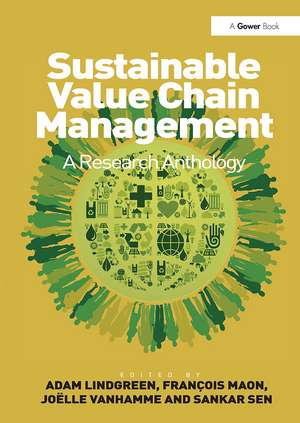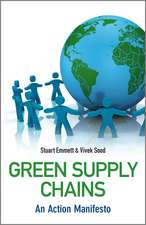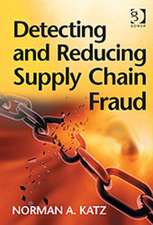Sustainable Value Chain Management: A Research Anthology
Autor François Maon Editat de Adam Lindgreen Autor Sankar Senen Limba Engleză Paperback – 24 iun 2024
| Toate formatele și edițiile | Preț | Express |
|---|---|---|
| Paperback (1) | 222.21 lei 6-8 săpt. | |
| Taylor & Francis – 24 iun 2024 | 222.21 lei 6-8 săpt. | |
| Hardback (1) | 706.90 lei 3-5 săpt. | |
| Taylor & Francis – 24 oct 2013 | 706.90 lei 3-5 săpt. |
Preț: 222.21 lei
Preț vechi: 280.18 lei
-21% Nou
Puncte Express: 333
Preț estimativ în valută:
42.52€ • 44.39$ • 35.19£
42.52€ • 44.39$ • 35.19£
Carte tipărită la comandă
Livrare economică 05-19 aprilie
Preluare comenzi: 021 569.72.76
Specificații
ISBN-13: 9781032836904
ISBN-10: 1032836903
Pagini: 578
Dimensiuni: 174 x 246 mm
Greutate: 1.07 kg
Ediția:1
Editura: Taylor & Francis
Colecția Routledge
Locul publicării:Oxford, United Kingdom
ISBN-10: 1032836903
Pagini: 578
Dimensiuni: 174 x 246 mm
Greutate: 1.07 kg
Ediția:1
Editura: Taylor & Francis
Colecția Routledge
Locul publicării:Oxford, United Kingdom
Public țintă
Professional Practice & DevelopmentRecenzii
’The last two decades have seen the growing recognition in business that social and environmental problems are increasingly business problems. Initially, it was in the sectors most obviously affected, such as the resource-extraction industries, now it is becoming widely taken for granted as businesspeople in many sectors come to see how their companies affect and are affected by forces such as climate change, resource scarcity, and population growth. As this research anthology makes amply clear, value chains are key to an effective response by companies to many of these sustainability challenges, and organizations are now starting to give attention to sustainability in managing their value chains. Drawing on a wide range of different geographical and industry perspectives, this rich collection of articles provides a basis for deeper understanding of both the sustainability challenges in value chains and the business opportunities.’ N. Craig Smith, INSEAD, Fontainebleau Cedex, France
Cuprins
I: Sustainable Value Chains: Context, Drivers, and Barriers; 1: Environmental Sustainability in the Supply Chain: A Review of Past Literature and Discussion of Potential Drivers and Barriers *; 2: Sustainable Procurement, Institutional Context and Top Management Commitment: An International Public Sector Study; 3: Environmental Research and Development, Public Policy, and Value Chain Management: A Competitive Advantage Perspective; 4: Human Rights in the Value Chain *; 5: The Growth of Private Regulation of Labor Standards in Global Supply Chains: Mission Impossible for Western Small and Medium-Sized Firms? *; 6: Supply Chain Themes in Corporate Social Responsibility Reports *; II: Sustainable Value Chains: Managing Activities; 7: Aligning Goals and Outcomes in Sustainable Supply Chain Management; 8: Setting a Framework for Life Cycle Assessment in Sustainable Technology Development; 9: Creating Socially Responsible and Environmentally Sustainable IT-Enabled Supply Chains; 10: Social and Environmental Responsibility, Sustainability, and Human Resource Practices; 11: Using Codes of Conduct to Help SMEs Manage Supply Chains: The Case of SA8000; 12: Environmental Standards and Certifications in a Value Chain Perspective: NGOs' View on the Legitimacy of the Process; 13: Applying Economic Non-Market Valuation for Sustainable Supply Chain Performance Measurement and Evaluation; III: Sustainable Value Chains: Managing Networks and Collaboration; 14: Green Offerings and Buyer�€“Supplier Collaboration in Value Chains; 15: Multi-Stakeholder Initiatives in Cotton Value Chains: Towards a Theoretical Framework and a Methodology; 16: Barriers and Facilitators to Developing Sustainable Networks: UK Local and Regional Food *; 17: Incorporating Impoverished Communities in Sustainable Supply Chains; 18: Learning to Improve or Deceive? Chinese Supplier Responses to MNC Codes of Conduct; 19: Understanding Resilience of Complex Value-Chain Networks; IV: Sustainable Value Chains: Integrative Perspectives; 20: Ever Expanding Responsibilities: Upstream and Downstream Corporate Social Responsibility; 21: Meta-Management of Corporate Social Responsibility; 22: When the Social Movement and Global Value Chain Literatures Meet: The Case of Fair Trade; V: Sustainable Value Chains: Specific Sectorial and Industry Perspectives; 23: Contributing to a More Sustainable Coffee Chain: Projects for Small Farmers Instigated by a Multinational Company; 24: Corporate Social Responsibility in the Bank Value Chain; 25: Sustainability in Value Chains: Empirical Evidence from the Greek Food Sector; 26: Standardizing Sustainability: Certification of Tanzanian Biofuel Smallholders in a Global Value Chain; 27: Sustainability in Humanitarian Organisations
Notă biografică
Dr Adam Lindgreen is Professor of Marketing at Cardiff Business School, with a Ph.D. from Cranfield University. He is widely published, in academic journals and books including Managing Market Relationships and A Stakeholder Approach to Corporate Social Responsibility. Dr François Maon is Associate Professor of Strategy and Corporate Social Responsibility at the IESEG School of Management, with a Ph.D. from the Louvain School of Management. He is widely published in academic journals and books including A Stakeholder Approach to Corporate Social Responsibility. Dr Joëlle Vanhamme is Professor of Marketing at Edhec Business School with a Ph.D. from the Louvain School of Management. She is widely published in academic journals and books including Memorable Customer Experiences and A Stakeholder Approach to Corporate Social Responsibility. Dr Sankar Sen is Professor of Marketing at Baruch College, City University of New York with a Ph.D. from the Wharton School (University of Pennsylvania). He is widely published in academic journals and books including Leveraging Corporate Responsibility: The Stakeholder Route to Maximizing Business and Social Value.
Descriere
The way organizations manage their value chain has changed dramatically over the past decade. Today, organizations take account of economic issues, but they also adopt a broader perspective of their purpose including social and environmental issues. Yet despite its global spread, sustainable value chain management remains an uncertain and poorly de











